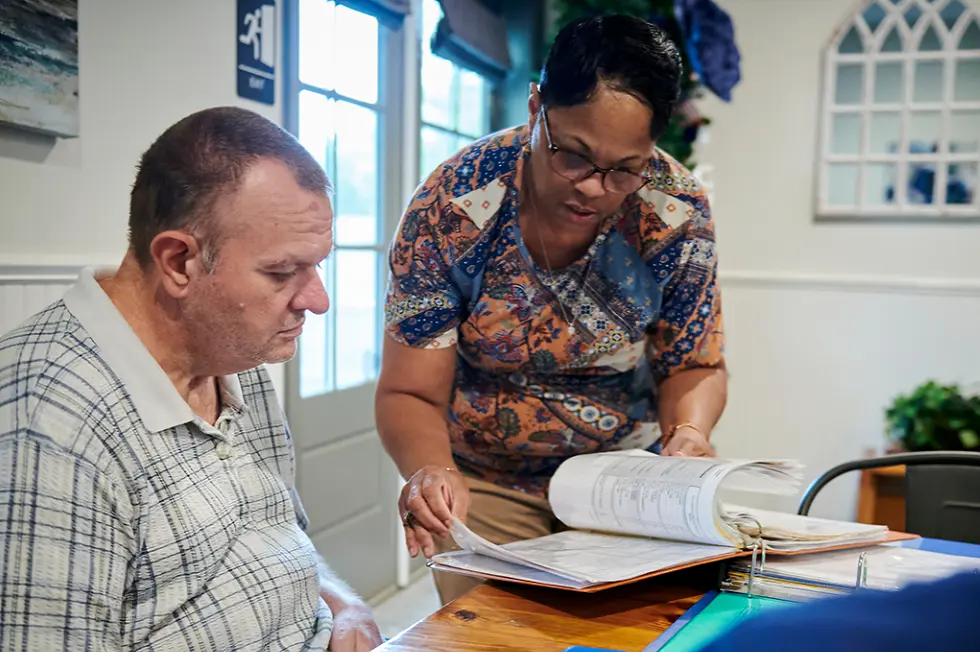Developmental disabilities can affect a person’s physical well-being or capabilities, their ability to learn, their ability to communicate and their behavior. Because these issues affect people throughout their entire lifetime, having an understanding, supportive, social environment is vital for them to feel and be successful.
For many disabled people who want a significant degree of independence yet are unable to live alone, living in group homes for adults with developmental disabilities offers the best of all worlds—independence with plenty of opportunity to grow, assistance when needed and healthy social interaction— all in a safe environment specially designed to meet their needs.
What Is a Group Home, and What Are the Benefits?
Group homes are small, residential-type facilities where adults with intellectual or developmental disabilities can live together on a permanent basis within a community. Residents have their own living quarters for privacy, but they also have access to common living areas as well as supervision and assistance to ensure they are safe and cared for. By living in an independent yet comfortable group home format, residents and their families can reap a number of benefits.
1. Independence with a Safety Net:
Many individuals with developmental disabilities reach a point in life where they want to go out in the world and live on their own. With disabled adult children living longer—and more often outliving their aging parents’ ability to care for them—transitioning to a group home setting earlier rather than later sets a path for independence and self-reliance.
Living in a group home gives a loved one the opportunity to live on their own in a way that’s right for them. Yet, they still have competent individuals available to support and guide them through daily living activities that they need help with.
To ensure that the home and conditions are a good match, personalized care plans are made to meet a resident’s specific needs and abilities. Group homes often have extensive resources and outreach programs within the community that give residents opportunities to develop skills, volunteer or even work at a job. Residents can get as much or as little assistance as they want or need.
2. Person-Centered Approach:
In a group home setting, care and attention are tailored to an individual’s specific wants, needs and skills to create a long-term plan for living. Individuals are defined by who they really are—not by their disability—and what they really want from life, not just what is available within the system.
Care providers are there to take the time to listen, observe and understand what leading a productive, meaningful life actually means to your loved one. And the best part is they can help develop the support systems and connections to make that happen. Respect for an individual’s personal choices is a key component of a person-centered approach.
Making informed decisions and taking responsibility for those choices and their risks nurtures a sense of empowerment and the ability to advocate for oneself throughout their lifetime. In short, a person-centered approach ensures an individual has the life that they really want, not just what a system might otherwise assign them.
3. Enhanced Socialization:
When adults with developmental disabilities live at home with family, they can actually become quite isolated and lonely. Living in a group home allows loved ones to interact with and form friendships with more people. Some of those people will be peers working to overcome similar challenges due to their own disabilities. Others will be caregivers and social workers who understand those challenges and are willing to share their training, experience and resources.
Some of the most rewarding experiences for group home residents are often the group activities and organized outings that let them know they are not alone and that they can claim their own place in the world.
4. Community Integration:
Group homes are also often referred to as community homes because a prime goal of group home caregivers and staff is to help their residents be active members of the communities where they live. They ensure their residents get to participate in local events—often with their peers and friends.
They help to arrange skill-based training for employment and maybe even a meaningful job that gives your loved one purpose. Equally important, community integration is an asset not only to residents striving to participate in life but also to the people in the community at large. Individuals with disabilities have much to offer their communities, and giving them opportunities to demonstrate that is key to breaking down archaic stereotypes and overcoming the stigma often attached to marginalized people.
5. Professional Support:
When caregivers don’t understand or feel comfortable with the vulnerabilities of adults with intellectual and developmental disabilities, loved ones can suffer. For example, individuals with intellectual or developmental disabilities are more at risk for developing chronic health conditions simply due to the fact that they often receive lower-quality care at home.
Living in a group home setting provides a direct, 24/7 support network of trained staff and caregivers who know, understand and respect their residents’ individual health challenges. Your loved one will receive not only the care and assistance they need, but they’ll also be able to access entire networks of specialized service providers who serve patients with developmental disabilities daily.
6. A Safe, Supportive Environment:
When people are in a safe, supportive environment, they’re able to thrive and grow. Group or community homes address this through a number of ways.
One of the most important offerings of a group home setting is a constructively structured routine. Routine not only ensures that everything gets done in a timely manner and helps build good habits, but it also can be key to learning new skills or adapting to new behaviors. Done well, routines also alleviate stress, anxiety and conflict because everyone knows what comes next and their role in each task.
Equally important, the adapted living spaces of a group home mean that the physical environment is suited to the people living there and the tasks they’re trying to accomplish. Group homes offer accommodations like lowered kitchen counters and sinks, for example, wide doorways and hallways, wheel-in showers, lifts and other accessible adaptations. Even décor is usually designed to relieve stress. For example, colors are often muted, spaces are kept clean and uncluttered, and areas are designed to control sound and noise.
In short, group homes can provide conditions and services for a loved one with developmental disabilities that would be difficult for a family to provide in their own home.
7. Family Involvement:
Perhaps one of the best aspects of finding the perfect group home setting for a loved one is the fact that family can be family. Mothers, fathers, sisters and brothers can simply be a parent or sibling versus caregiver, decision-maker, teacher, chauffeur, nurse, nutritionist and aide, for example.
Meanwhile, family members can enjoy seeing their loved one mature into the best version of themselves. With that said, family members can be a vital part of their adult child’s success through collaboration with group home professional support staff. It’s important to realize that residential staff don’t take on the responsibilities or roles of an individual’s parents or siblings. Staff retain professional relationships while family members enjoy personal relationships with the resident.
The best outcomes result when family members and staff work in partnership and maintain an easy flow of communication to ensure a loved one is thriving.
How To Find the Best Group Home Setting for Your Adult Child With Developmental Disabilities
Finding the right group home for your adult child may feel like a daunting task. They may be the last child to leave home, the transition may seem scary, or you may worry about your child not receiving care that is right or sufficient for their needs.
However, when an adult child is matched with the right set of peers and housemates, resources, staff and opportunities, the maturation, self-sufficiency and sheer joy in living can be amazing.
At Arc of Acadiana, we offer inclusivity, support and a collaborative process to ensure your loved one has everything they need to achieve a level of independence and self-sufficiency that will put your mind at ease. If you’d like to know more, you can take a look at our Community Group Homes for Disabled Adults page. Then, contact us to have a more in-depth conversation about our group home offerings.
https://bramblesva.com/group-homes-offer-adults-disabilities/
https://www.socialworktoday.com/archive/exc_011909.shtml
https://www.envisionunlimited.org/understanding-stigma-and-disability
https://www.psychologicalscience.org/observer/one-of-us
https://thearc.org/policy-advocacy/housing/
https://www.childserve.org/a-parent-guide-to-group-homes-icf-id-or-scl/
https://specialneedsanswers.com/housing-options-for-adults-with-special-needs-14975

